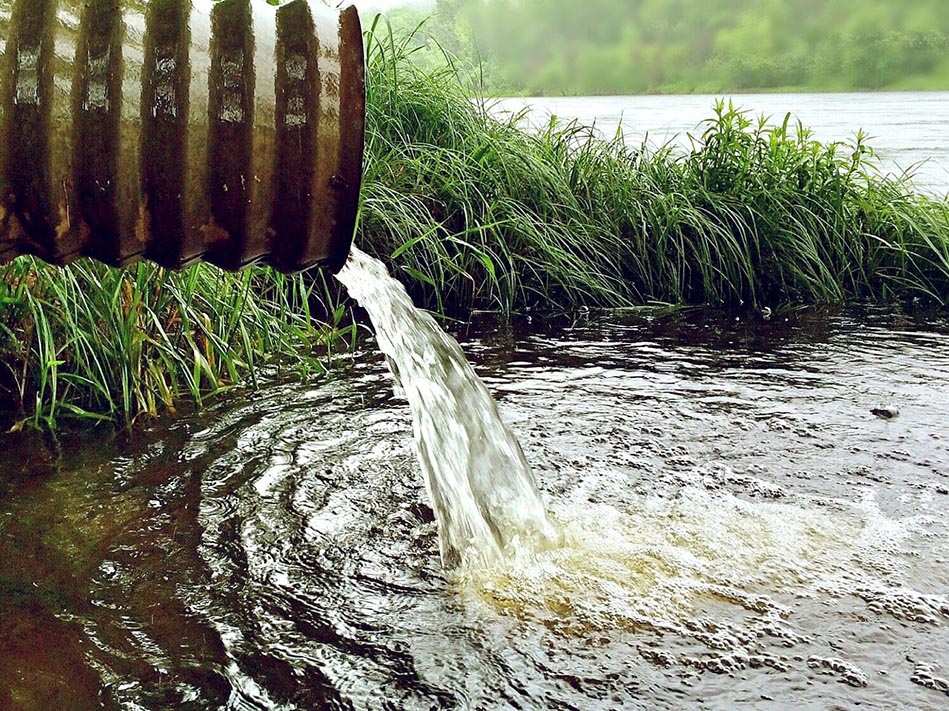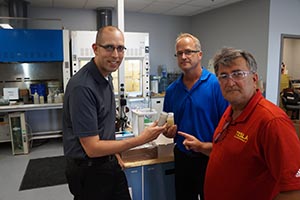Engineers developing kit to test for, destroy, pesticides in water

August 4, 2016
McMaster Engineers are on a search-and-destroy mission, and their target is the industrial poison found in water.
Chemical Engineers David Latulippe and Carlos Filipe have partnered with Brantford, Ontario’s Aevitas – as Canada-wide recycling and waste management company – to create a low-cost, fast-acting, biocide-detection system.
Biocides include pesticides, disinfectants and preservatives and are often used by industrial manufacturers to control the growth of bacteria and other microorganisms in wastewater – a similar process to adding chlorine to a pool.
The problem is, they remain active for long periods of time, and can be harmful to humans and the environment.

They’re also very difficult and costly to detect.
Millions of litres of biocide-contaminated wastewater are produced every year in Canada. They are sent to special treatment plants such as Aevitas, which cleans industrial wastewater before sending it to municipal treatment plants.
The McMaster-Aevitas partnership will develop a rapid detection method in a simple-to-use kit that will reduce testing time to just 20 minutes. It will also aim to detect a variety of biocide types and develop treatment solutions to remove or destroy biocides from wastewater streams.
“We are very fortunate to partner with Aevitas as it gives our research teams the opportunity to develop new technologies for a variety of wastewater types and thus have a significant impact on the entire wastewater treatment field,” says Latulippe.
“The overall usage of biocides at manufacturing plants is expected to be dramatically reduced by providing them with the detection kits to measure biocide levels in their wastewater. The proposed research is expected to yield a significant improvement in the quality of the treated wastewater and thus lead to healthier aquatic ecosystems in the receiving water bodies.”
“This project will endeavour to keep Aevitas at the leading edge of wastewater treatment, an industry that will soon become the most critical segment of environmental protection,” says Tom Maxwell, Vice-President of Aevitas.
Recent changes to the Wastewater Systems Effluent Regulation (WSER) under the Federal Fisheries Act have tightened restrictions on discharge criteria prompting many municipalities to upgrade their sewer use bylaws. Brantford is one of the first municipalities to enforce the new standards and has notified its industrial and manufacturing partners about the change, providing the industry with enough lead time to meet the new standards that come into effect as early as 2020.
Similarly, in February 2016 the city of Toronto updated their sewer use by-laws to address the discharge of wastewater from specific manufacturing sectors.
The research project is a two-year agreement supported by the Ontario Centres of Excellence (OCE) Voucher for Innovation and Productivity II (VIPII) program. “OCE is pleased to be able to stand behind this innovative solution to wastewater treatment,” said Dr. Tom Corr, OCE’s President and CEO. “We have a long history of supporting research that not only helps with environmental protection, but supports Ontario’s economic prosperity as well.”
Currently a Aevitas-McMaster pilot project, the research could have a far-reaching impact on the entire field of wastewater treatment including municipalities looking for cost-effective ways to comply with the new federal biocide regulation.


